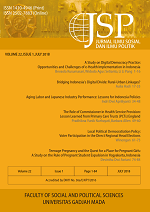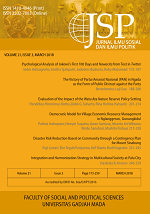Democracy, Human Development, Income Distribution and Regional Economic Performance: A Panel Data Analysis of 34 Provinces in Indonesia
Rosdiana Sijabat(1*)
(1) Department of Business Administration, Atma Jaya Catholic University of Indonesia
(*) Corresponding Author
Abstract
Many studies have concluded that the condition of democracy, the level of human development, and income distribution have associations with economic performance as measured by economic growth. However, the results of empirical studies on the relationship between these variables remain inconclusive. The objective of this study is to examine the effects of democracy, human development, and income distribution on economic growth in Indonesia's 34 provinces between 2012 and 2020. This study uses panel data analysis conducted using a Fixed Effect Model (FEM) approach. The findings reveal that human development (as measured using the Human Development Index) significantly affects gross regional domestic product (GRDP) growth. Meanwhile, democracy (measured through the Democracy Index) and income inequality (measured using the Gini Coefficient) are not statistically affected by GRDP growth. The findings have policy implications for provincial governments in developing policies that encourage strategic investment in human resources. The provincial government can implement policies that enhance the association between human development and economic development. Such policies are essential due to the strong relationship between human development and regional economic growth, necessitating an integrated strategy to enhance human and economic development.
Keywords
Full Text:
PDFReferences
Acemoglu, D., Naidu, S., Restrepo, P., & Robinson, J. A. (2019). Democracy Does Cause Growth. Journal of Political Economy, 127(1), 47-100. http://dx.doi.org/10.1086/700936
Adeleye, B. A., Gershon, O., Ogundi, A., Owolabi, O., Ogunrinola, I., & Adediran, O. (2020). Comparative investigation of the growth- poverty-inequality trilemma in Sub-Saharan Africa and Latin American and Caribbean Countries. Heliyon, 6(12), 1-11. https://doi. org/10.1016/j.heliyon.2020.e05631
Adlin, A., Harahap, H. I., & Yusri, A. (2022). Indonesian elections in the shadow of money politics: strengthening stakeholders’ commitment and creating anti-money politics villages. International Journal of Asia Pacific Studies, 18(1), 169–196. https://doi.org/10.21315/ijaps2022.18.1.8
Ahmed, S., & Trabelsi, M. A. (2022). Economic resilience in developing countries: The role of democracy in the face of external shocks. Entrepreneurial Business and Economics Review, 10(1), 23-34. https://doi.org/10.15678/EBER.2022.100102
Alenda-Demoutiez, J. (2022). From economic growth to the human: reviewing the history of development visions over time and moving forward. Third World Quarterly, 1038-1055. https://doi.org/10.1080/01436597.2022.2042680
Aljarallah, R. A. (2020). The Economic Impacts of Natural Resource Dependency in Gulf Countries . Journal of Energy Economics and Policy, Econjournals, 10(6), 36-52. https://doi.org/10.32479/ijeep.9836
Ameur, A. A., & Seffih, S. (2021). Income Inequality and Economic Growth in Algeria: Empirical Study during the Period 1980-2015. Management Dynamics in the Knowledge Economy, 9(1), 39-49. https://doi.org/10.2478/mdke-2021-0003
Aminuddin, M. F., & Attamimi, N. H. (2019). From Retail to Grocery: Money Politics in 2014 Indonesian Legislative Election. Politik Indonesia: Indonesian Political Science Review, 4(1), 99-120. https://doi.org/10.15294/ipsr.v4i1.12609
Appiah, M., Amoasi, R., & Frowne, D. I. (2019). Human Development and Its Effects on Economic Growth and Development. International Research Journal of Business Studies, 12(2), 101-109. https://doi.org/10.21632/irjbs
Ar, M. M., Rofik, & Hanafi, A. (2023). Expensive Political Costs in the 2024 Simultaneous Elections. Jurnal Hukum dan Sosial Politik, 1(1), 1-20. https://doi.org/10.59581/jhsp-widyakarya.v1i1.144
Awad, A., Yussof, I., Ismail, R., & Sarmidi, T. (2014). Economic growth and human development–what do time series data say for Sudan? Middle East Development Journal, 6(2), 151-174. https://doi.org/10.1080/17938120.2014.961329
Baklouti, N., & Boujelbene, Y. (2018). The Nexus Between Democracy and Economic Growth: Evidence from Dynamic Simultaneous-Equations Models. Journal of the Knowledge Economy, 9(3), 980-998. https://doi.org/10.1007/s13132-016-0380-x
Baltagi, B. (2008). Econometric Analysis of Panel Data. Chichester: John Wiley & Sons Ltd.
Baptista, R., & Mendonça, J. (2010). Proximity to Knowledge Sources and The Location of Knowledge-Based Start-Ups. T he Annals of Regional Science, 5-29. https://doi. org/10.1007/s00168-009-0289-4
Barro, R. J. (1991). Economic Growth in a Cross Section of Countries. Quarterly Journal of Economics, 407-443.
Besarria, C. N., Araujo, J. M., da Silva, A. F., Sobral, E. F., & Pereira, T. G. (2018). Effects of income inequality on the economic growth of Brazilian states: An analysis using the cointegrated panel model. International Journal of Social Economies, 45(3), 548-563. https://doi.org/10.1108/IJSE-02-2017-0039
Bhargava, A., Jamison, D., Lau, L., & Murray, C. (2001). Modeling the effects of health on economic growth . J Health Econ, 20(3), 423-440. https://doi.org/10.1016/s0167-6296(01)00073-x
Bouincha, M., & Karim, M. (2018). Income Inequality and Economic Growth: An Analysis Using a Panel Dat. International Journal of Economics and Finance, 242-253. https://doi.org/10.5539/ijef.v10n5p242
Brereton, R. G. (2015). The T-Distribution and Its Relationship to The Normal Distribution. Journal of Chemometrics, 481-483. https://doi.org/10.1002/cem.2713
Ciftci, C., & Durusu-Ciftci, D. (2022). Economic freedom, foreign direct investment, and economic growth: The role of sub-components of freedom. The Journal of International Trade & Economic, 233-254. https://doi.org/10.1080/09638199.2021.1962392
Cingano, F. (2014). Trends in Income Inequality and its Impact on Economic Growth. Paris: OECD Publishing. https://dx.doi.org/10.1787/5jxrjncwxv6j-en
Collier, P., & Hoeffler, A. (2009). Testing the Neocon Agenda: Democracy in Resource- Rich Societies. European Economic Review, 293-308. https://doi.org/10.1016/j.euroecorev.2008.05.006
Fleurbaey, M. (2009). Beyond GDP: The Quest for a Measure of Social Welfare. Journal of Economic Literature, 1029-1075. https://doi.org/10.1257/jel.47.4.1029
Greene, W. (2008). Econometric Analysis. 6th Edition, Pearson Prentice Hall, Upper Saddle River. Upper Saddle River: Pearson Prentice Hall.
Hamdan, A., Sarea, A., Khamis, R., & Anasweh, M. (2020). A causality analysis of the link between higher education and economic development: empirical evidence. Heliyon, 1-6. https://doi.org/10.1016/j.heliyon.2020.e04046
Hanushek, E.A. (31 deAugust de 2021). Education and Economic Growth. Discussion Paper, No.1764 April 2021. London: Centre for Economic Performance, London School of Economics and Political Science. Obtido em 23 de January de 2022, de https://cep. lse.ac.uk/pubs/download/dp1764.pdf
Hausman, J. A. (1978). Specification Tests in Econometrics. Econometrica, 1251-1271.
Hoa, P. T., Liem, L. T., & Phuoc, N. K. (2016). Human Development Index Impact on Economic Growth. Ho Chi Minh City Open University Journal of Science, 6(1). https:// doi.org/10.46223/HCMCOUJS.econ. en.6.1.106.2016
Hsiao, C. (May de 2006). Panel Data Analysis – Advantages and Challenges. IEPR Working Papert 06.49. Obtido em 17 deMarch de 2022, de htp://www.usc.edu/iepr
Jianu, I., Dinu, M., Huru, D., & Bodislav, A. (2021). Examining the Relationship between Income Inequality and Growth from the Perspective of EU Member States’ Stage of Development. Sustainability, 13, 5204. https://doi.org/10.3390/su13095204
Kabir, M. A., & Alam, N. (2021). The Efficacy of Democracy and Freedom in Fostering Economic Growth. Emerging Economy Studies , 76–93. https://doi.org/10.1177/2394901521105794
Karadžić, V., & Dalović, N. (2021). Profitability determinants of big European Banks. Journal of Central Banking Theory and Practice, 102, 39-56.https://doi.org/10.2478/jcbtp-2021-0013
Khodaverdian, S. (2022). The African Tragedy: the Effect of Democracy on Economic Growth. Empirical Economics, 1147-1175. https://doi.org/10.1007/s00181-021-02049-9
Klaus, & Gründler, K. T. (2016). Democracy and growth: Evidence from a machine learning indicator. European Journal of Political Economy, 45, 85-107. https://doi.org/10.1016/j.ejpoleco.2016.05.005
Lal, S., Singh, R., Makun, K., Chand, N., & Khan, M. (2021). Socio Economic and Demographic Determinants of Fertility in Six Selected Pacific Island Countries: An Empirical Study. Plos One. https://doi.org/10.1371/journal.pone.0257570
Lengfelder, C. (2016). Polic ies for human development. New York,: United Nations Development Program.
Liu, P., Peng, Y., Shi, Y., & Yang, J. (2021). Financial structures, political risk and economic growth. The European Journal of Finance. https://doi.org/10.1080/1351847X.2021.1879888
Mankiw, G., Weil, D., & Romer, D. (1992). A Contribution to the Empirics of Economic Growth. The Quarterly Journal of Economics, 107, 407-437. https://doi.org/10.2307/2118477
Mdingi, K., & Ho, S.-Y. (2021). Literature review on incom e inequality and economic growth. MethodsX, 8. https://doi.org/10.1016/j.mex.2021.101402
Mthanti, T., & Ojah, K. (2018). Institutions, Human Capital and Entrepreneurial Orientation: Implications for Growth Policy. Journal of Entrepreneurship and Public Policy, 135-160. https://doi.org/10.1108/JEPP-D-18-00002
Nair, M. S. (2018). Human Development and Economic Growth in Kerala: Sustainability Issues. Productivity, 59(1). https://doi.org/10.32381/PROD.2018.59.01.9
Narayan, P., Narayan, S., & Smyth, R. (2011). Does Democracy Facilitate Economic Growth or Does Economic Growth Facilitate Democracy? An Empirical Study of Sub-Saharan Africa. Economic Modelling, 900-910. https://doi.org/10.1016/j.econmod.2010.11.004
Nayak, P. (2009). Human Development: Conceptual and Measurement Issues. Em P. Nayak, Growth and Human Development in North-East India (pp. 19-23). Oxford: Oxford University Press.
Nayebyazdi, A. (2017). The Relationship B etween Democracy and Economic Growth in Muslim Mena Countries (Spatial Econometric Approach). Journal of Smart Economic Growth, 123-135.
Neeliah, H. (2016). Does humancapital contribute to economic growth in Mauritius? European Journal of Training and Development, 248-261.
Neeliah, H., & Seetanah, B. (2015). Does Human Capital Contribute to Economic Growth in Mauritius? European Journal of Training and Development, 248-261.
Nosier, S., & El-Karamani, A. (2018). The Indirect Effect of Democracy on Economic Growth in the MENA Region (1990–2015). Economies, 61(6). https://doi.org/10.3390/ economies6040061
Obobisa, E. S., Chen, H., Ayamba, E. C., & Mensah, C. N. (2021). The Causal Relationship Between China-Africa Trade, China OFDI, and Economic Growth of African Countries. Journals Sagepub, 1-17. https://doi.org/10.1177/21582440211064
Okolie, A.-M., Nnamani, K. E., Ezirim, G. E., Enyiazu, C., & Ozor, A. C. (2021). Does liberal democracy promote economic Does liberal democracy promote economic development trade-off in Nigeria’s fourth republic. Cogent Social Sciences.
Oloyede, B., Osabuohien, E., & Ejemeyovwi, J. (2021). Trade openness and economic growth in Africa's regional economic communities: empirical evidence from ECOWAS and SADC. Heliyon, 7(5). https://doi.org/10.1016/j.heliyon.2021.e06996.
Öztürk, S., & Suluk, S. (2020). The Granger causality relationship between human development and economic growth: The case of Norway. Intenational Journal of Research in Business and Social Science, 9(6), 143-153. https://doi.org/10.20525/ijrbs.v9i6.902
Plumper, T., & Troeger, V. E. (2019). Not so Harmless After All: The Fixed-Effects Model. Political Analysis, 21-45. https:// doi.org/10.1017/pan.2018.17
Prinos, I., & Manley, J. (2022). The Preston Model: Economic Democracy, Cooperation, and Paradoxes in Organisational and Social Identification. Sociological Research Online, 1-17. https://doi.org/10.1177/136078042110693
Rachdi, H., & Saidi, H. (2015). Democracy and Economic Growth: Evidence in MENA countries. Procedia-Social and Behavioral Sciences, 616-621. https://doi.org/10.1016/j.sbspro.2015.04.644
Rahmana, R. A., Rajab, M. A., & Ryan, C. (2020). The Impact of Human Development on Economic Growth: A Panel Data Approach. htpp://10.2139/ssrn.3526909
Ranger, J., & Much, S. (2020). Analyzing the Fit of IRT Models With the Hausman Test. Frontiers in Psychology, 1-13. https://doi. org/10.3389/fpsyg.2020.00149
Ranis, G., & Stewart, F. (2001). Growth and Human Development: Pakistan in Comparative Perspectives. The Pakistan Development Review, 333-352.
Siami-Namini, S., & Hudson, D. (2019). Inflation and income inequality in developed and developing countries. Journal of Economic Studies, 46(3), 611-632. https://doi.org/10.1108/JES-02-2018-0045
Simangunsong, D., & Kuang-Hui, C. (2018). Inequality and Economic Growth in Indonesia in The 2000’s. Signifikan: Jurnal Ilmu Ekonomi, 7(2), 201-212. https://doi.org/10.15408/sjie.v7i2.6177
Syaban, A. S., & Appiah-Opoku, S. (2023). Building Indonesia’s new capital city: an in-depth analysis of prospects and challenges from current capital city of Jakarta to Kalimantan. Urban, Planning and Transport Research, 11(1), 1-29. https:// doi.org/10.1080/21650020.2023.2276415
Topolewski, L. (2020). The impact of income inequalities on economic growth. Ekonomia i Prawo. Economics and Law, 19(2), 355–365. https://doi.org/10.12775/EiP.2020.024
Touitou, M. (2021). Estimating the relationship between governance, economic growth, inequality and poverty. Theoretical and Practical Research in Economic Fields, 21-30. https://doi.org/10.14505//tpref.v12.1(23).03.
Uddin, M. A., Ali, M. H., & Masih, M. (2021). Institutions, human capital and economic growth in developing countries. Economics and Finance, 361-383. https://doi. org/10.1108/SEF-10-2019-0407
UNDP. (1996). Human Development Report. New York: United Nations Development Programme.
Westfall, P. H. (2014). Kurtosis as Peakedness, 1905–2014. R.I.P. The American Statistician, 191-195. https://doi.org/10.1080/00031305.2014.917055.
Yoon, J., & Galvao, A. F. (2020). Cluster robust covariance matrix estimation in panel quantile regression with individual fixed effects. Quantitative Economics, 11, 1-30. https://doi.org/10.3982/QE802
You, J.-S. (2015). Democracy, Inequality and Corruption: Theory and Hypotheses. Em J.-s. You, In Democracy, Inequality and Corruption: Korea, Taiwan and the Philippines Co m pa red (pp. 1-28). Cambridge: Cambridge University Press.
Yumna, A., Yumna, A., Rakhmadi, M. F., Rakhmadi, M. F., Hidayat, M. F., Hidayat, M. F., . . . Suryahadi, A. (2015). Estimating the Impact of Inequality on Growth and Unemployment in Indonesia. Jakarta: SMERU Research Institute.
Zhao, L. (2021). Tourism, Institutions, and Poverty Alleviation: Empirical Evidence from China. Journal of Travel Research, 1543-1565. https://doi.org/10.1177/0047287520947792
Article Metrics
Refbacks
- There are currently no refbacks.
Copyright (c) 2024 Jurnal Ilmu Sosial dan Ilmu Politik
License URL: https://creativecommons.org/licenses/by-sa/4.0






















